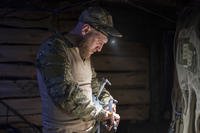U.S. troops fighting Islamic militants in northern Iraq and possibly Syria will receive combat pay, Defense Secretary Chuck Hagel said.
The issue of special military compensation surfaced Thursday during a hearing of the House Armed Services Committee, chaired by Howard "Buck" McKeon, R- California, on the Obama administration’s strategy for combating the Islamic State in Iraq and the Levant, known as ISIL or simply the Islamic State.
Rep. Richard Nugent, R-Florida, asked Hagel whether American service members deploying to the country will receive combat pay. Hagel confirmed they would receive the additional compensation technically known as hostile fire and imminent danger pay.
"They will be compensated," the secretary said, noting that he intends to approve the special pay. His comments echoed those that Pentagon Press Secretary Navy Rear Adm. John Kirby made in June.
A service member can receive an extra $7.50 per day, up to $225 per month, of hostile fire and imminent danger pay, in addition to basic pay. The rules were changed in 2012 to only allow the pay for days troops actually spend in hazardous areas.
Troops are eligible for the pay if subjected to hostile fire or explosion of hostile mines; killed, injured, or wounded by such hostile action; or threatened by physical harm or imminent danger on the basis of civil insurrection, civil war, terrorism, or wartime conditions.
The U.S. military since early August has launched thousands of airstrikes in northern Iraq against militants affiliated with the Islamic State, an al-Qaeda-inspired terrorist group that has overtaken parts of Iraq and Syria, after the group released video depicting the beheading of American journalists.
President Obama last week announced the deployment of 475 more ground troops to Iraq to advise Iraqi and Kurdish forces in Baghdad and Erbil, bringing the total number of U.S. service members in the country to about 1,600. He’s also considering expanding airstrikes to include targets in Syria.
Addressing troops on Wednesday at MacDill Air Force Base in Florida, the headquarters for U.S. Central Command, Obama vowed he wouldn’t support putting a large number of boots on the ground in Iraq.
"As your commander-in-chief, I will not commit you and the rest of our Armed Forces to fighting another ground war in Iraq," he said. "After a decade of massive ground deployments, it is more effective to use our unique capabilities in support of partners on the ground so they can secure their own countries’ futures. And that's the only solution that will succeed over the long term."
As part of a stop-gap funding measure to keep the government running through mid-December, the House of Representatives on Wednesday approved by a vote of 273-156 the president’s plan to arm and train "appropriately vetted" rebels to fight the Islamic State. The Senate was expected to vote on the measure later Thursday. The legislation would be limited to providing $500 million of existing funding to train and equip 5,000 members of the Free Syrian Army.
While Obama has repeatedly pledged to avoid using ground troops to fight the Islamic State, both Hagel and Chairman of the Joint Chiefs of Staff Gen. Martin Dempsey have suggested otherwise.
"We are at war and everything is on the table," Hagel said during Thursday’s hearing.
Dempsey earlier this week told the Senate Armed Services Committee, headed by Sen. Carl Levin, D-Michigan, that U.S. ground troops – in certain scenarios – could become involved in attacks against the Islamic militants. What’s more, he said, U.S. commanders have already sought permission to deploy small teams of U.S. advisers into battle with Iraqi troops and that the president might be persuaded to change his mind, according to an article by Craig Whitlock of The Washington Post.
"He has told me as well to come back to him on a case-by-case basis," the general said, according to the article. "If we reach the point where I believe our advisers should accompany Iraqi troops on attacks against specific [Islamic State] targets, I’ll recommend that to the president."
Dempsey is joined by other a handful of influential military and defense experts who oppose ruling out the use of combat troops in Iraq or Syria, including former Defense Secretary Robert Gates, Army Chief of Staff Gen. Raymond Odierno, and retired Marine Corps Gens. Anthony Zinni and James Mattis, both of whom headed up Central Command.
-- Brendan McGarry can be reached at brendan.mcgarry@monster.com



























